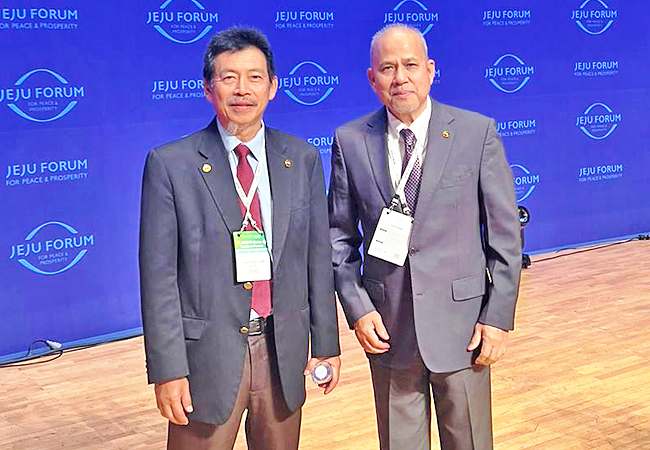Azlan Othman
National Chamber of Commerce and Industry Brunei Darussalam (NCCIBD) President Haji Abdul Saman bin Haji Ahmad and Deputy Secretary General Haji Halim bin Saim attended the ASEAN-Korea Leaders Forum in Jeju, South Korea on June 1-2.
Organised by the Jeju Special Self-Governing Province and sponsored by the Ministry of Foreign Affairs, the forum was a special programme of the 18th Jeju Forum for Peace and Prosperity, aimed to promote inter-parliamentary and business cooperation between Korea and ASEAN member states.
Jeju Forum for Peace and Prosperity was launched in 2001. It brings together Parliaments and businesses of Korea and ASEAN member states to affirm each other’s strategic importance, pledge solidarity, and explore ways to forge mutually beneficial cooperation based on inclusiveness and trust.
The two-part forum addressed the roles of Parliaments and businesses in the facilitation of supply chain cooperation and sustainable cooperation on climate change. Former United Nations secretary-general Ban Ki-moon in his keynote speech said, “Jeju Forum 2 launched in 2001 as a dynamic platform for timely dialogue that not only shares visions for peace on the Korean Peninsula, in East Asia, and the world; but also seeks creative solutions through international cooperation.
“Humanity has always faced continual challenges and has eventually been successful in overcoming them. However, the global challenges before us now are unprecedented. They are multifaceted, complicated, and overwhelming in their scale and character.

“We have learnt many hard lessons from the COVID-19 pandemic over the last three years. We also experienced the magnitude of the negative impacts of climate change on our daily lives. The spectre of the pandemic is passing, but many scientists warn that others will emerge especially if the climate crisis continues.”
He added, “As we all are well aware, the Indo-Pacific region is the most vibrant and dynamic in the global economy, as its population corresponds to 65 per cent of the world and its economic output accounts for 60 per cent of the world.
“If we want this region to continue its sustainable peace and prosperity, we must address the challenges of climate crisis and the deteriorating United States-China relationship.
“Therefore, any individual or country, however strong, cannot solve such problems alone. The cascading climate crisis might represent the single most difficult transnational challenge for us all.”






